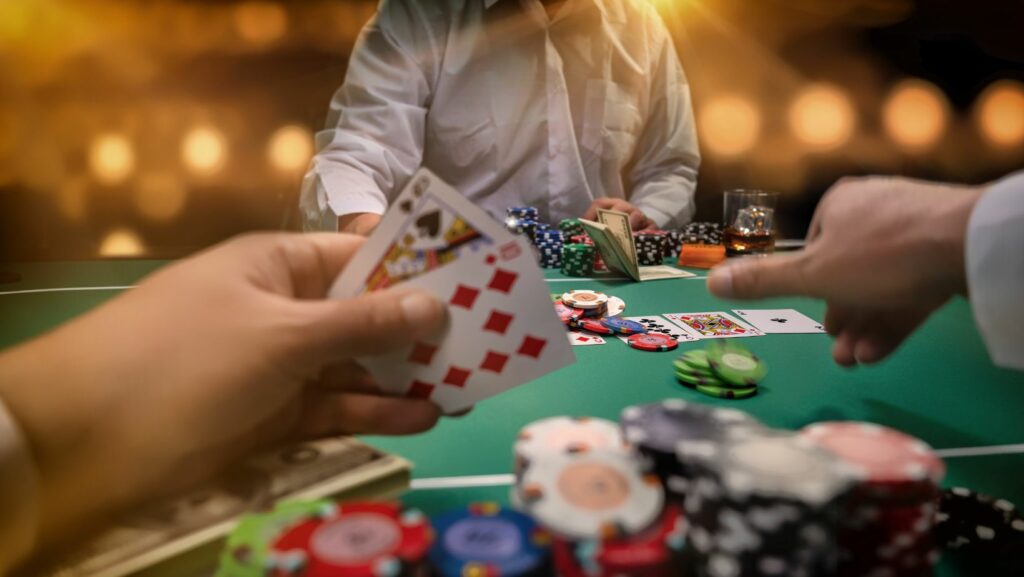Meta Title: Most 10 Mistakes to Avoid in Online Poker
Meta Description: Learn the top 10 mistakes you should avoid in online poker. Improve your game and increase your chances of winning.
Online poker is fun and thrilling — not strange that it ranks among the most popular casino games. But it is also complicated, so only a few players master it. In this guide, I’ve collected the most common poker mistakes. Learn to avoid them, and you will quickly raise your play to a new level.
Poker Rules
The basic poker rules are simple. Each player gets two cards. Five community cards are dealt. The goal is to make the best hand. But to succeed, one has to mix their knowledge of card ranking and hands with bluffing skills and a pinch of luck. In this equation, you can delete an element — each is important.
Why Is Poker So Popular?
The popularity of online poker is immense, and it has grown even more with the invention of online gambling platforms like Bizzo Casino. Eventually, everything comes to these three reasons.
- Poker is a social game that requires a lot of interaction. You talk, read body signs, and try to study opponents’ psychology. The process is exciting.
- The game challenges gamblers. It’s not easy. Here, you must rely on your logic, intuition, and skill. Some even use poker as mental training, which has its right to be.
- It’s classical. Many gamblers seek games with classical flair, and poker caters to them.
Overall, there are no signs that poker will drop in popularity. But at this point, some of you may feel like it isn’t your type. Too complex… too tackling… requires too many investments. The casino world is varied, so you can try something easier, like slots or crash games, and then move to tabletop games. If that’s your choice, please find all the details here.
For those willing to tame this game, let me introduce the ten common mistakes to avoid while playing it.
10 Common Mistakes in Online Poker
Playing Too Many Hands
New players often play every hand. Don’t. Be picky. Play only strong hands. If you don’t do this, you risk draining your chips too quickly. Here’s the golden rule of poker: quality over quantity. Be sure to follow it.
Ignoring Position
Your position at the table matters. Early position? Play tight. Late position? You can be looser.
As you can see, the importance is enormous. Besides, the later you play, the more information you can gather about your opponents. So, don’t miss your chances.
Overvaluing Weak Hands
Don’t fall in love with a bad hand. Fold when you should. Don’t chase unlikely wins. Some hands look good when they are not, so let go of them.

But how do you know whether a hand is weak or strong? It’s where your basic poker knowledge comes in.
Bluffing Too Much
Bluffing is part of poker. But too much can hurt. Bluff wisely. Know when to hold ’em and when to fold ’em. Always keep your behavior strategic. Otherwise, you risk being caught by your opponents. Once they know your strategy, you become predictable and lose more often.
Not Paying Attention
Stay focused. Watch your opponents. Notice their habits and tell. Small details can show a lot, so don’t miss them. Similarly, turn off the notification when you’re online. Sure, you don’t want those little distractions to let you down.
Chasing Losses
Have you lost a big hand? Don’t try to win it back right away. Take a break. Stay calm. Chasing losses leads to even bigger losses. So, don’t betray your initial strategy and stay within your budget.
Playing When Tired
Tired players make mistakes. Play when you’re fresh and alert. I usually avoid late evenings, nighttime, and periods after work. However, it is individual. Listen to your body.
Ignoring Bankroll Management
You should know how much you can lose before you even start to play. Outline some sum you can comfortably risk. Don’t let it eat up on your day-to-day expenditures. Gambling is about entertainment. It’s okay to pay for entertainment, but avoid losing money.
Playing Above Your Skill Level
Stick to games that match your skill.

Don’t jump into high-stakes games too soon. First, build your skill set and challenge high-rollers only then. Gradually move as you improve.
Failing to Adapt
Poker is dynamic. Adapt to the game and your opponents. Change your strategy as needed. Please keep track of the competitors and see how they react. Then, change your behavior accordingly.
Conclusion
To improve your online poker game, avoid these mistakes. Be smart, stay focused, and play within your limits. Remember, poker is a game of skill and strategy. Learn from your mistakes and keep getting better. Happy playing!

